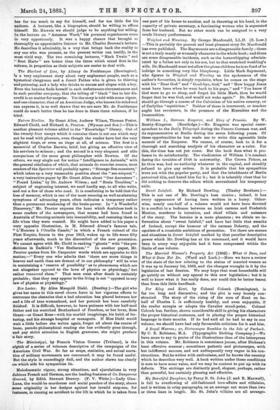Nature Studies. By Grant Allen, Andrew Wilson, Thomas Foster, Edward
Clodd, and Richard A. Proctor. (Wyman and Son.)—This is another pleasant volume added to the "Knowledge" library. Out of the twenty-four essays which it contains there is not one which may not be read with pleasure, even though the reader have but the very slightest tinge, or even no tinge at all, of science. The first is a memorial of Charles Darwin, brief, but giving an effective view of his services to science ; and the second is a very eloquent and able -comparison of the same great philosopher with Newton. Of the others, we may single out for notice "Intelligence in Animals," with the general conclusion of which, that animals do exercise reason, most readers of the Spectator will probably agree ; " Strange Sea-monsters," which takes up a very reasonable position about the " sea-serpent " ; a very instructive paper by Mr. Grant Allen about " Our Ancestors " ; 4‘ Found Links," by Dr. Andrew Wilson ; and " Brain Troubles," a subject of engrossing interest, we need hardly say, to all who write, and not a few of those who read. It is comforting to be told that the loss of memory, which is one of the most amazing as well as alarming symptoms of advancing years, often indicates a temporary rather than a permanent weakening of the brain-power. In "A Wonderful Discovery," Mr. Proctor exposes the hoax which doubtless took in some readers of the newspapers, that means had been found in Australia of freezing animals into insensibility, and restoring them to life when they were wanted. He might have added to his paper a very apposite illustration, in M. Edmond Aboat's famous tale, " L'Homme a l'Oreille Cassee," in which a French colonel of the First Empire, frozen in the year 1813, wakes up to life some fifty years afterwards, much to the discomfort of the new generation. We cannot agree with Mr. Clodd in ranking "ghosts" with "the pre- dictions in Zadkiel's Vox Stellaram.' " In another paper, Mr. Proctor quotes from Dr. Carpenter words which are apposite to this matter,—" Every one who admits that there are more things in heaven and earth than are dreamt of in our philosophy' will be wise in maintaining a reserve of possibility' as to phenomena which are not altogether opposed to the laws of physics or physiology,' but rather transcend them." That men exist after death is certainly probable ; that they may appear to the living is not " opposed to any law of physics or physiology."


































 Previous page
Previous page